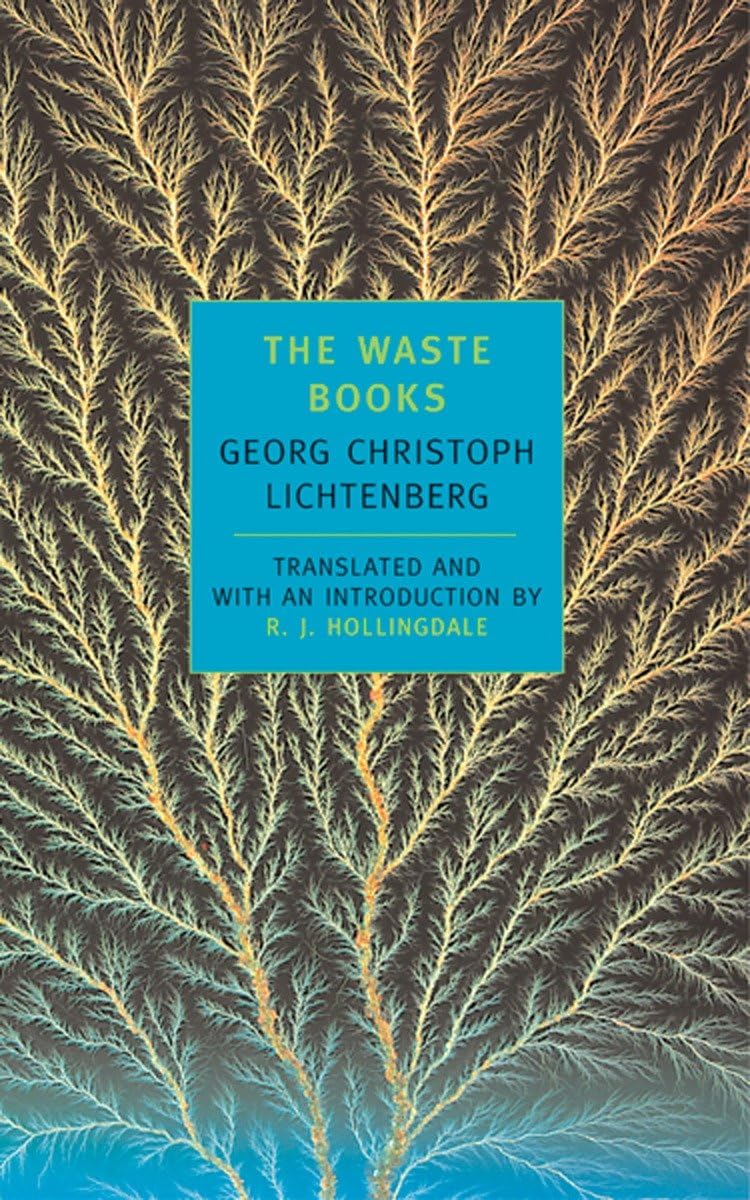

The Waste Books (New York Review Books Classics)
V**R
Sudelbücher
Somewhere between Pascal and Nietzsche. Very enjoyable. Here are some extracts:'I am afraid that the excessively careful education we provide is cultivating dwarf fruit.''There are serious illnesses of which we can die; there are, further, those which, although we do not exactly die of them, are nonetheless very perceptible; finally there, however, are also those which are barely perceptible without a microscope, though when this is applied they too appear dreadful: and this microscope is hypochondria. I believe that if men seriously devoted themselves to studying the microscopic diseases they could have the satisfaction of being ill every day.''The prospect of mankind's progress towards greater perfection seems a dismal one when we consult the analogue of all that lives.''The greater the man, the more culpable he is if he blabs about the faults of people he knows. If God proclaimed the secrets of men, the world could not endure.''In England a man was charged with bigamy and his lawyer got him off by proving that his client had three wives.'
B**E
Pithy abundance
"Man loves company, even if it is only that of a smouldering candle."Lichtenberg's THE WASTE BOOKS is a book I've been dipping into for years and years. Chock-full of humorous, insightful, wise and quirky thoughts and observations, it is a great book to have on one's bedside table. Within its pages the reader will discover a mix of brilliantly crafted aphorisms, philosophical jottings and sketches, linguistic experiments, proverbs, jokes and curious phrases - 1,085 entries in all. Highly recommended to those who enjoy "wit and wisdom" in equal measure."The most successful tempters and thus the most dangerous are the deluded deluders." - Notebook F, aphorism 120.
K**G
Refreshing
Lichtenberg truly observes and thinks, forgive my cliched phrase, with a child's wonder. Thinking and Observing are, for him, downright entertainment not, as for most of us, labour-work. Even such strict critics as Schopenhauer and Nietszche have to off-hat to this unusual man.One point to note for this translation: Mr. Hollingdale sometimes omits some part of an aphorism without obvious reasons. Take the first aphorism as an example: the translation reads:'the great artifice of regarding small deviations from the truch as being the truth itself is at the same time the foundation of wit...'; while the original is 'Der grosse Kunstgriff, kleine Abweichungen von der Wahrheit fur die Wahrheit selbst zu halten, worauf die ganze Differentialrechnung gebaut ist, ist auch zugleich der Grund unserer witzigen Gedanken...'; why the phrase 'worauf die ganze Differentialrechnung gebaut ist' is not translated? Sometimes Lichtenberg's idea just keeps rambling, and it makes sense on the translator's part to cut it short, but in some cases Mr. Hollingdale's chopping puzzles me.All the same, this edition is a valuable one, supplementing the "Lichtenberg Reader" translated, edited and introduced by Franz H. Mautner and Henry Hatfield. Readers who have German can consult the 4-vol. "Schriften und Briefe" edited by Wolfgang Promies (with 2 useful vol.s of "Kommentar"; Hanser Verlag, 1967).I guess any lover of Lichtenberg would often murmur to themselves: 'May this wonderful man be better known!' And I think this translation has served well to make Lichtenberg better known in many parts of the world.
M**K
Bizarrely Fascinating
The ruminations of a true polymath. Loved the reflections on morbidity and particularly his thoughts on suicide. Many have made the obvious comparison to an olden day Twitter account, but I think there is an important distinction in that Lichtenberg did this for himself. This wasn't to broadcast some sort of image, this was a personal chronicling of daily thoughts, many of which are quite heady and many are humorous. I recommend this title highly for those who read a lot of "thinking man's" books and wants something lighter and easy to pick up and put down. It's NOT a novel or even cohesive in theme, so don't buy this looking for a message either.
K**E
Gimlet-eyed brilliance
Alfred Brendel chose this as his desert island book - and planted the seeds across the world as a result. A non-stuffy polymath, Lichtenberg despised most writers who failed to come up to his demands of intelligence and applied wit. A physicist to begin with, his logic, observation and ironic slants make this the ideal bedside book - or even better, one to be kept in the loo. Imagine a mix of Oscar Wilde, Voltaire and La Rochefoucauld, and you're not far away. 'The fly that does not wish to be swatted is safest if it sits on the fly-swat.' - and more than a thousand other resonating maxims for illicit use.
Trustpilot
3 weeks ago
1 day ago